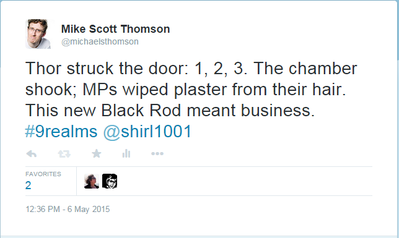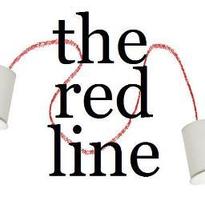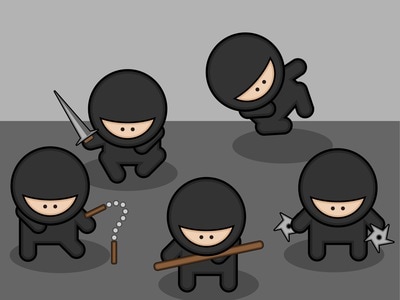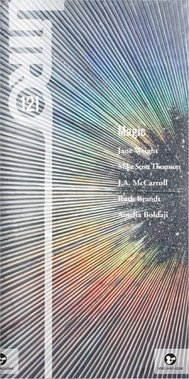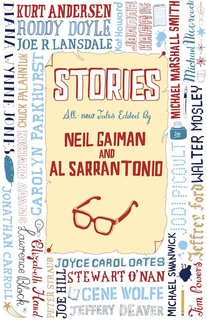| An unfathomably long time ago (that'll be nearly four years), the short story publisher The Fiction Desk accepted, and subsequently published, my short story "Me, Robot" in their fourth volume "Crying Just Like Anybody". It's a process I recall well: from the moment I pinged it off to them, to the immensely satisfying moment it appeared in print a few months later. Now in 2016, the writer Chris Fielden has re-published the story in full on his website (a site chock full of magazine listings, competition listings, writing advice, and services: invaluable for both the emerging and established writer). Alongside my story, you can read my advice-for-writers article: "How to Research, Write & Publish a Short Story", using my experiences with "Me, Robot" and The Fiction Desk as case study examples. Additionally, as an added "bonus": within my article, whilst making a somewhat meandering point about writing "rules", I inadvertently challenged the reader to write a short story consisting "mostly" of that most frowned-upon, horribly-overused, tool-of-telling-rather-than-showing, word type that, as writers, we're always being told to cut out of our work: the adverb. Thus "Mike's Not-Entirely-Serious Wantonly-Rule-Breaking Adverb-Writing Challenge" is born. (Who knows what beast I've helped unleash upon the unsuspecting literary world.) Having had a crack at my own challenge (you can read my effort, "Giving it the Adverbals", alongside other writers' adverb-riddled efforts on the same page), I would say that there could be a point to the exercise after all: try this once, you're not going to want to write another adverb ever again. If you're a writer (or even if you're not) and fancy a go, please do. All efforts will be published on Chris's site. |
|
This month, I've been online, via a variety of media... Firstly, here's the resulting video of Chris Fielden's "To Hull and Back" competition, which I won last year. Can a literary award get any cooler than this? Then came a Tweet-length story I sent to Shirley Golden (@shirl1001), which I was pleased to see she marked as one of her favourites. The remit was to place Thor, the Norse god of thunder, in an unusual setting. (This was part of the intriguing "Nine Realms", a Viking-themed collaborative project combining art, poetry, and stories, which is well worth a look.) My tweet is below, but you can read all the very entertaining efforts at the Artipeeps website. Finally, I wrote an article entitled "What Makes a Good Short Story?" for the online literary magazine The Red Line. I'm not entirely sure I succeeded in addressing the question, but I did manage to shoehorn in references to pies, Ferraris and ninjas. So that's OK.
Sometimes it seems more has been written about what makes a good short story than short stories themselves. Whole books have been written on the craft. Soundbites-a-plenty pop up on social media. You may have heard the one about how “a novel is a film, but a short story is a photograph”. Or Stephen King’s one about how a short story is “a kiss in the dark from a stranger”. There are a million more like it. Also available for perusal are the introduction pages to many (usually academically-minded) short story anthologies. I’ve seen editors stretch literary theory so much they’ve used pie charts to illustrate whatever point they’re making. My own personal problem is, whenever I get an excess of complicated or esoteric advice about the right and wrong ways to approach the form, no matter how well intentioned they may be, it makes me want to lie down. Or eat pie. (Or maybe that’s just whenever I see a pie chart.) I’ll give you an example. I once submitted a story to a journal I thought would be a good fit for it. They rejected it, but that’s cool. Rejection is an absolute par for the course for any writer submitting their work for publication. What singled this one out was the editor’s candid assessment of my work. He was ever so good to take the trouble for me; few publications have the time to go to such lengths to support writers in this way. Hence, I didn’t mind when this editor chap called my work “slow-paced, not very interesting and overly long.” Blunt, maybe, but that’s one man’s opinion – I couldn’t argue with it (and, truth be told, he was probably right). I wasn’t sore about him rejecting my work, or his own subjective opinion of it. What alarmed me was when his comments took an objective turn. “The form,” he wrote, “should sit somewhere between the poem and the novel.” He went on to say that, in a short story, the author “does only half the work” – the other half should be done by the reader, since “that’s the way it’s meant to be”. I’ll give another example. One year I entered one of the (many hundreds of) short story competitions in the UK. I didn’t get anywhere; no biggie. But I was intrigued by the judge’s summing up notes. To paraphrase, “so much happened in some of the short stories I read, it felt as if I was strapped to the back of a Ferrari and driven at speed down a wind tunnel”. He went on to imply that short stories should be as minimalist and as stripped down as possible, otherwise they weren’t “true to the form”. Sure enough, 1st, 2nd and 3rd places in that competition were awarded to slice-of-life stories where very little happened other than the vaguest of shifts in the characters’ viewpoints. I don’t know about you, but I rather like the idea of a short story which makes me feel like I’ve been strapped to the back of a Ferrari and driven at speed down a wind tunnel. And that appears to be the crux of it. If I really wanted to get published in the above-mentioned literary journal, I should have sent a concise piece of prose-poetry. If I wanted to do well in that competition, I should have sent a piece of fiction with where almost nothing transpired. (To wit: no Ferraris. No wind tunnels. And most certainly no ninjas. Tragically, this goes against the popular trope that “everything is better with ninjas”, which does make me feel a little sad.) But does that mean all short stories must be minimalist, stripped-down, nothing-happening slice-of-life slabs of poetic prose, as these two chaps attest?
I would say: no, of course it doesn’t. Maybe that’s not the popular consensus, though. But interestingly enough, I do half agree with these fellas. Short stories are, after all, short. All the minutiae of plot and character you would otherwise find in a novel is expunged. For that reason, I’d say the short story form lends itself very well to “letting the reader do half the work”. As it follows, it provides a good opportunity to test the reader by letting them fill in the gaps for themselves. (I’ve read good arguments from writers and critics who actually define the short story form by its ability to do this.) By its brevity, the short story form also lends itself very well to tales where “nothing much happens”. Subtle stories of this nature are, I would wager, more effective over the course of a condensed 2,000 words than a rambling 80,000. And should the style of a short story always fall somewhere between a poem and a novel? Well, I suggest a short story does lend itself very well to that. (I couldn’t stomach a whole novel of it. It would be like eating a whole pie. Sorry, there we go with the pies again). However, I personally maintain there are no universal rules about what a short story can and cannot be. Anyone who says otherwise is merely revealing their own tastes and prejudices. In summary: my own approach is to forget about rules. Even, when it comes to a first draft at least, to forget about making it any good. I just kick back and write what I want. The result is often much more likely to be entertaining and engaging. If I’m getting bogged down with the intricacies of the right or wrong way to write a piece of fiction, the whole process gets frustrating. If it's frustrating, I won’t be enthused. This lack of enthusiasm comes across, clear as day. If you as the writer are not entertained or engaged as you write it, nor will the reader be when they read it. All the best stories I’ve written are the ones I had the most fun writing; it’s no coincidence many of them got published or won prizes. None of them deliberately followed what I would call the “traditional” short story form. Once I’ve let rip with my first draft, I then, depending on my intentions for it, shape and mould it in the editing process; cut superfluous bits out, sharpen the prose, adjust the storyline and characters according to feedback, whatever. In other words, improve the writing (which is a huge topic in its own right). I’m now going to finish off my story about being strapped to the back of a Ferrari whilst being driven down a wind tunnel. Then I’m going to search for a market for it. Wish me luck. For me, Christmas 2012 was a purple patch for my writing. (I'll break off here for a moment. Did you know that 'purple patch' is also a literary term? I didn't. I just looked it up. It means 'An overly elaborate or effusive piece of writing'. How appropriate.) Fresh from my story ‘Me, Robot’ appearing in the latest volume of short fiction from The Fiction Desk (it's called 'Crying Just Like Anybody' and all the stories are excellent - go buy it!), I then had another acceptance. I was in the middle of my work's Christmas lunch at a nearby pub, when I got the email from Litro Magazine to say they enjoyed my short story ‘The Real Miracle’ and wanted to publish it in their next issue. I nearly spluttered Guinness all over my lamb shank. That’ll teach me to fiddle with my iPhone at a social occasion. Still – what news! What a Christmas present! Litro are both a print and online magazine, primarily publishing short stories but also poems, articles, interviews and artworks. The print issue is free - a neat, pocket-sized thing which you can pick up from their stockists - and with a print run of, apparently, 100,000, to have a story accepted by them was a genuine chin-dropping moment. Litro are also notable in that each issue of their magazine is centred on a theme. Some magazines and journals avoid themed issues, preferring to keep an open submissions policy, but it does work very, very well for Litro. Over the past couple of years they've brought out magazines on Ghosts, Work, Food, Street, Comics, War and places such as China, Africa, France and Rio. They're absorbing, fascinating and imaginative reads, with their website offering back issues in electronic format, and much more besides. "The Real Miracle" appeared in an issue with a "Magic" theme. I absolutely couldn't resist having a go. I used to be a very keen magician when I was younger - I performed stage shows, competed with the best young magicians in the country in national competitions, and even made it on telly two or three times - therefore with my story, I was able to draw on some personal experience. Due to this I was hopefully able to convey some authenticity - and of course I didn't have to do too much in the way of research. Whilst on this occasion writing to a theme worked very well for me - it only took about a week to finish the story to my satisfaction - recently it proved a challenge too far. Over December, I was writing a story with a slipstream, slightly supernatural edge. The brief was "the railway", and had I been able to pull it off, it would have been considered for an anthology which, if past books by the publisher are anything to go by, will be a very fine tome indeed.
Usually when I start writing a story, I finish it. For the first time ever, I gave up. It simply wasn't working. Whether it was clunky prose, ill-considered characterisation, the lack of time I had as Christmas approached, or just my lack of affinity with the railway, I don't know. Probably a bit of all of them, but more, I suspect, the fact that I couldn't think of a good story. I had all year to work on it, all year to research the railway if that is what I needed to actually do. Yet I had to admit this one wasn't going to happen. Just wanting to be published isn't enough. I needed to have a story worth telling. Was it writer's block? Maybe. But I don't lack other ideas, so maybe working to a specific theme was the wrong thing to try in this instance. Perhaps I'll come back to it, if inspiration strikes. Maybe it'll prompt me to read a bit about the railway, or about the life George Stephenson. Something good will come of it. I don't like leaving things unfinished! In the meantime, there's 2013 to look forward to. I hope to have a few bits and pieces coming out over the next few months, themed or otherwise. Stay tuned! Further to my previous blog post, I should add – and it’s a point long overdue – that I also write short stories because I love the form. To read each one is to enter a new world, with its own complexities of character and situation, concentrated all within a twenty minute read or less. They can be as absorbing, if not more so, than many full length novels. This year I have been greedily gobbling up as many as I can find – in anthologies, websites, magazines and journals – so much so, in fact, that I wonder whether I should give each one time to settle in my mind before moving on to the next one. A good short story should indeed be powerful: capable of packing a full punch that any good novel would be capable of, but within only a few thousand words. The test for me, I think, is how much I can remember of it two to three days after finishing, and whether the emotional ups and downs, or conflict, of the story has stayed lodged in my consciousness. Thus maybe a little ‘absorbing’ time after I finish each one may be in order. If I can withstand the temptation, that is… One thing I don’t want to do here is to analyse, at least any more than my somewhat unoriginal attempt above, what makes a good short story. It’s been done so many times already, not least in the prefaces of the various anthologies I’ve been reading, that this overdose of advanced literary theory has made my head spin. Character driven vs plot driven; implied vs explicit; the power of words left unsaid vs too much information; what makes a cliché and how to avoid them; using metaphor to discern the difference in style and technique between short stories and novels; even line graphs to illustrate plot arcs. There’s so much that’s been said that I don’t think I could add any more. As a writer, I’m still trying to find my way. Admittedly, this is mostly by making mistakes and learning from feedback, either from my writers’ groups or from competition/rejection post-mortems. Also, of course, from reading, reading, reading, and seeing what other writers are doing well and how I can learn from them – plus comparing and contrasting the different anthologies and competition results to see what one editor/judge may like. What do they think makes a good short story, as opposed to another editor/judge? It’s interesting to see how opinions differ. One judge of a recent short story competition bemoaned the entrants who tried to do ‘too much’ within a mere three thousand words, with the fast pace leaving him exhausted (sure enough, the winning stories were all tales where, to be quite honest, nothing much happened at all – and therein lay the art of them). Yet, another anthology I’ve been reading (namely, "Stories", edited by Neil Gaiman and Al Sarrantonio) worked to the brief that each story should make the reader ask themselves "And then what happened?" To my mind this implies the opposite; they wanted page turners, ergo, a bit of pace and, dare I say it, action. OK, they were skilfully done, and each one works perfectly within the short story form – but I wonder whether any of them would have been rated in that aforementioned competition. That’s not to say one’s right and one’s wrong, of course. As a previous commenter on my blog has mentioned, if you’re a writer and wish to be published (or win a competition), it’s about targeting your story to an editor or judge who may actually like it. If that needs research, then so be it – i.e. if I see a competition, recognise the name of the judge, know his/her style or the sorts of stories he/she’s rated in competitions before, then I’ll have a much better idea what to submit of my own. Likewise, with anthologies, having read volumes of them over the past few months, I have (I hope) a fairly good idea of the kind of stories which may go down well in those volumes, and will target them accordingly. I hear a lot about competition judges and anthology editors who complain about submissions written by authors who have clearly never read anything in their catalogues before. And – I will hold my hands up here – this would have been me, in the distant past. Crazy, rookie mistake – and not one I will make again. This more considered approach is starting to pay off, both in terms of confidence in my own writing and acceptances, which is slowly but surely creeping upwards. I’ve listed here some of the publishers of short story anthologies I’ve been reading and enjoying over the past year – all are quality and well worth checking out. For the purposes of brevity rather than more Luddite tendencies, I have only mentioned those which are available to be perused as those satisfyingly tangible pre-Internet binded papery flappy things – otherwise known as ‘books’. (Although a few are available for your Kindle, or what-have-you.)
If you have any recommendations for me, please leave a comment! The Fiction Desk Unthank Books Riptide Journal Cinnamon Press Earlyworks Press Salt Publishing Comma Press Short Fiction Journal Eibonvale Press Competition anthologies of prizewinners/shortlisted entrants from the Bridport Prize, Bristol Prize and Willesden Herald Not read yet but high on my shopping list: prizewinning anthologies from Biscuit Publishing and Fish Publishing |
Archives
May 2021
Categories
All
|

